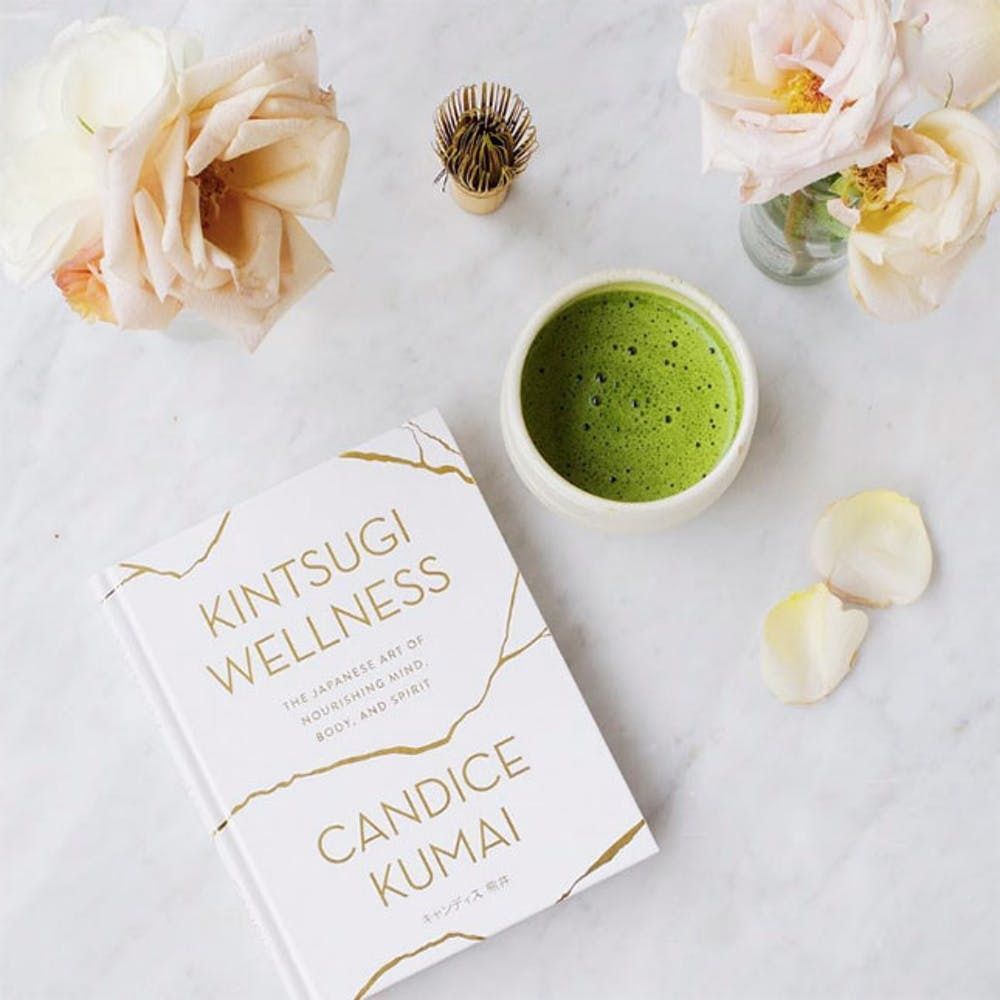Candice Kumai Shares the Japanese Practice That’ll Set Your Inner Perfectionist Free
Loving yourself is an essential component of self-care, but it can be hard to do when you’ve faced disappointment, received rejection, or made a career mistake. We caught up with bestselling author and Elle‘s “golden girl of wellness” Candice Kumai to talk about kintsugi and wabi sabi, Japanese practices that foster happy and healthy living by celebrating imperfection. Read on for the deets about Kumai’s new book Kintsugi Wellness($30) and how these art forms inform her sense of self and inspire her in her life and work.
Brit + Co: Your newest book is all about kintsugi, the Japanese art of repairing broken pottery with lacquer dusted or mixed with powdered gold, silver, or platinum. What inspired you to write an entire book dedicated to the art?
Candice Kumai: Wow, this is such a powerful question! I was raised by my Japanese mother and Polish-American father to always practice and celebrate my ancestors’ traditions, but kintsugi was one I had to find and experience on my own. A few years ago, I had my heart deeply broken, and as a result, my faith in my relationships [and] my faith in New York was lost. It felt like my journey and life were unraveling, and I had to find a real-life way to make it whole again. Separately, I’ve been writing my bestselling books and for all the top magazines (and in wellness) for so long now, [and] I recently started to feel that we had all collectively begun to lose touch with what was really important in life and in living well.
I went to Japan to study my family’s traditions and to say goodbye to Baachan (“grandma” in Japanese) who was passing away. Along the way, I had researched wabi sabi (which is accepting imperfection) and kintsugi (golden repair). I was inspired to study my heritage and write about both of these ancient Japanese practices — they made more sense to me than anything else in modern-day Western culture as far as healing and mending go. This is where I begin to shift my sails and I began writing about wellness, heritage, and various cultures. These traditional practices have wowed me.
B+C: When were you first introduced to the idea of kintsugi? What about it struck you as inspiring or helpful?
CK: Chapter one of Kintsugi Wellness is all about how I stumbled upon a real kintsugi master in Kyoto, Japan, and learned from him. It was truly an honor (and so inspiring) to learn of my ancestors’ work directly from the sources in my mother’s homeland of Japan.
B+C: How has Kintsugi Wellness helped you embrace personal struggles in your own professional journey?
CK: I think the deepest and most profound love I found was the resilience (called gaman in Japanese) in the survivors of WWII. I interviewed the elderly in Okinawa, Japan, along with my own family, and I was helped to realize what’s truly important in life: endurance, survival, grace, empathy, acceptance, and forgiveness. Even more, osettai, or being of service to each other, is another practice that’s so important.
When these people were so kind and brave enough to tell me their stories, it helped me to… see what true honor and resilience [are]. Our problems are nothing compared to the horrors of what war can bring: having to hide, living in fear, and escaping from death. I feel so grateful that we are not in this situation, and we should also pray for those still affected by the horrors of war.
B+C: How can Kintsugi Wellness help someone overcome perfectionism or making a mistake?
CK: Chapter two of the book is dedicated to studying “wabi sabi,” the art of embracing imperfection. It truly helps for us to learn to accept we are all simply perfectly imperfect. I have really gone deep into this practice; it’s the name of my new podcast [as well as] chapter two in Kintsugi Wellness… the way my parents met was wabi sabi and my whole life — the way I look, my career, my life’s calling, all of it — is wabi sabi, perfectly imperfect.
I think of life as all things are meant to happen as they are, even the trauma and bad things — all of it. If we live in the moment, maybe we can later see with some reflection that there are no mistakes, no regrets, and no looking back.
B+C: You’ve written bestsellers and inspired thousands of readers with your work. What are you most proud of? What’s next?
I feel very grateful for the space I’m in; being a self-made woman, an Asian woman, and a child of immigrants has worked against me in many ways. Now, I can see the perfectly imperfect view of how there is a huge light that is coming from the darkness of my past. I hope for us all to better understand [that] without darkness, light cannot and will not exist.
I’ve had the most amazing time on various podcasts promoting my new book (it’s been picked up in nine countries so far!) and getting to know incredible friends like Rosie Acosta, Sahara Rose, Lewis Howes, The Almost 30 girls, the Skinny Confidential team, The Ultimate Health Podcast, and so many more. So for my birthday last week, I decided it would be the best gift for myself to launch my new perfectly imperfect podcast! I want to keep helping others to become even better at their craft and achieving their dreams. (Photo via Candice Kumai)
How do you embrace your imperfections or use your struggles to achieve your goals? Tell us on Twitter @BritandCo.
Brit + Co may at times use affiliate links to promote products sold by others, but always offers genuine editorial recommendations.
(Featured photo via @candicekumai)
